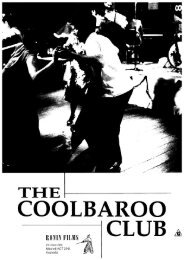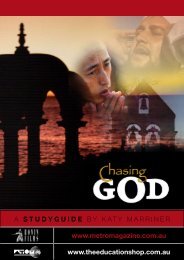to download THE LONG GOODBYE study guide - Ronin Films
to download THE LONG GOODBYE study guide - Ronin Films
to download THE LONG GOODBYE study guide - Ronin Films
You also want an ePaper? Increase the reach of your titles
YUMPU automatically turns print PDFs into web optimized ePapers that Google loves.
<strong>THE</strong><br />
<strong>LONG</strong><br />
Goodbye<br />
A STUDY GUIDE by Marguerite o’hara<br />
http://www.metromagazine.com.au<br />
http://www.theeducationshop.com.au
Above: Myrle & Ken<br />
Hauser, April 2008<br />
Memory is a way of holding on <strong>to</strong> the things you love, the things you<br />
are, the things you never want <strong>to</strong> lose. – Kevin Arnold<br />
Introduction<br />
Every week 1300 more Australians are diagnosed with dementia and the numbers continue <strong>to</strong> escalate<br />
in line with our ageing population. There are currently 245 000 Australians living with dementia<br />
and it’s estimated that there will be over 1.13 million by 2050. Raised in the unparalleled optimism<br />
and prosperity of the ‘50s and ‘60s, the baby boomers are accus<strong>to</strong>med <strong>to</strong> controlling their own destiny.<br />
As the dementia epidemic looms it is unknown whether science will save them this time.<br />
The Long Goodbye follows the journeys of three families living with dementia as they struggle <strong>to</strong> maintain<br />
the identity and dignity of those they love. Filmed over a three-year period, the documentary celebrates<br />
the capacity of the human spirit <strong>to</strong> search for meaning and hope when the end is known and inescapable.<br />
– Kay Harrison, filmmaker<br />
SCREEN EDUCATION<br />
2
Synopsis<br />
The three families we meet in this documentary are<br />
at different stages of the condition we call dementia<br />
and they each offer a different perspective.<br />
Michael, a criminal barrister with four dependant<br />
children was diagnosed with early onset Alzheimer’s<br />
disease at the age of forty-nine. Three years on<br />
and still in the early stages of his condition, Michael<br />
retains insight and articulately shares his thoughts<br />
and feelings from within the disease. Although adamant<br />
he will fight on with a positive attitude and a<br />
sense of humour, Michael struggles with the loss of<br />
his professional identity and the shifting relationship<br />
dynamics within the family home. As his condition<br />
deteriorates, Michael and his family bravely strive <strong>to</strong><br />
maintain as normal a family life as possible and <strong>to</strong><br />
live each day as it comes.<br />
The second strand is from the perspective of Myrle,<br />
an elderly carer committed <strong>to</strong> looking after her husband<br />
of 60 years until his dying day. Well in<strong>to</strong> the<br />
mid stages of his Vascular dementia, Ken requires<br />
constant care and supervision. A fiercely independent<br />
woman, Myrle knocks back all offers of help;<br />
she sees it as her duty and is determined <strong>to</strong> carry<br />
out the caring responsibility alone. Although Myrle<br />
maintains control over all aspects of Ken’s care she<br />
is unable <strong>to</strong> control the decline of her beloved. As<br />
Ken’s condition deteriorates, Myrle is faced with the<br />
fact that she is losing the love of her life. The burden<br />
of care continues <strong>to</strong> build and Myrle’s health<br />
is significantly threatened. Forced <strong>to</strong> relinquish<br />
control over Ken’s care Myrle must find a new way<br />
<strong>to</strong> stay with her man.<br />
The final strand is from the perspective of Tom, a<br />
72-year-old carer who is desperately struggling <strong>to</strong><br />
look after his wife Brenda who is in the latter stages<br />
of her Alzheimer’s disease. No longer able <strong>to</strong> care<br />
for Brenda at home, Tom very reluctantly opts for<br />
dementia specific residential care. Racked with<br />
guilt and loneliness, Tom struggles <strong>to</strong> cope with<br />
his new life separated from his wife. As Brenda’s<br />
memory and speech continue <strong>to</strong> diminish and she<br />
slowly withdraws from the world they shared, Tom<br />
refuses <strong>to</strong> let her go. He finds a new way <strong>to</strong> remain<br />
connected with his soul mate, the woman who<br />
loves him yet no longer remembers his name.<br />
– Kay Harrison, Filmmaker<br />
Curriculum Relevance<br />
The Long Goodbye would be an excellent film <strong>to</strong><br />
show <strong>to</strong> middle, senior and tertiary students across<br />
a number of subject areas including Health and<br />
Personal Development, Community Services Studies<br />
including Studies of Ageing and Family Studies.<br />
For students interested in working in Geriatric Services<br />
and undertaking certificates in Personal Care<br />
and/or Aged Care, this film has much <strong>to</strong> offer and<br />
explore through discussion of some of the issues<br />
raised.<br />
For Media and Film Studies students this is a fine<br />
example of a sensitively made documentary that<br />
shows people at their most vulnerable while retaining<br />
a respectful distance and respect for their dignity<br />
and need for privacy. While these are s<strong>to</strong>ries of<br />
individual families, there are some fac<strong>to</strong>rs common<br />
<strong>to</strong> all people living with, understanding and learning<br />
<strong>to</strong> cope with, the challenges and sense of loss<br />
engendered by this illness in all these situations.<br />
The film raises the issue of how as a society and<br />
as individuals and family members we can best<br />
serve and care for an ageing population. What is<br />
the most appropriate form of care for both individuals<br />
with forms of dementia and for those who love<br />
them How do we know when we can no longer<br />
manage the family member at home<br />
Above: Myrle<br />
gardening, Ken in<br />
background<br />
About the Film<br />
The Long Goodbye is a<br />
55-minute documentary<br />
by Luminous <strong>Films</strong> Pty<br />
Ltd and Kaye Harrison,<br />
produced in association<br />
with Screen Australia,<br />
Screen NSW and ABC<br />
TV.<br />
Direc<strong>to</strong>r, camera and<br />
sound recording: Kaye<br />
Harrison<br />
Edi<strong>to</strong>r: Karen Johnson<br />
Producer: Gina Twyble<br />
Music: Caitlin Yeo<br />
SCREEN EDUCATION<br />
3
Pre-viewing student activity<br />
Growing Older<br />
Will you still need me, will you still feed me when<br />
I’m 64.<br />
– The Beatles<br />
I want <strong>to</strong> die before I get old.<br />
– The Who<br />
As we age we are more likely <strong>to</strong> develop illnesses<br />
like cancer and heart disease. As the information<br />
and data about dementia provided earlier in this<br />
<strong>guide</strong> demonstrates, the likelihood of developing<br />
some form of dementia increases as we age. The<br />
Key Facts from the Alzheimer’s information organisation<br />
page state:<br />
• The baby boomer bulge in the Australian<br />
population means that the coming decade will<br />
see an acceleration of the impacts of ageing on<br />
dementia prevalence.<br />
• The first baby boomers turn 65 in 2010 and<br />
there will be 75, 000 baby boomers with dementia<br />
by 2020<br />
• Dementia is the fourth most common cause of<br />
death after heart disease, stroke and lung cancer.<br />
While people are living longer because of developments<br />
in medical science and better access <strong>to</strong><br />
treatment and care, there are social and economic<br />
fac<strong>to</strong>rs that need <strong>to</strong> be carefully considered in relation<br />
<strong>to</strong> a growing ageing population.<br />
Respond <strong>to</strong> the following questions designed <strong>to</strong><br />
encourage your thinking about the realities of ageing<br />
and how we care for older people in our society.<br />
Above:<br />
Sandy & Brenda<br />
• In general terms at what age do you consider<br />
people <strong>to</strong> be ‘old’ Is it at retirement age, pension<br />
age, when their hair turns white or falls out,<br />
or when people can no longer manage <strong>to</strong> live at<br />
home<br />
• Have you ever, or regularly, visited a relative or<br />
friend in a hostel or nursing home<br />
• What are some of the difficulties young visi<strong>to</strong>rs<br />
experience when they visit relatives in nursing<br />
homes or other care facilities<br />
• Should immediate family members be responsible<br />
for providing primary care for their relatives<br />
as they age In what circumstances might this<br />
be difficult or impossible or just ‘<strong>to</strong>o hard’<br />
• Do you think housing elderly people <strong>to</strong>gether,<br />
whether in a retirement village, hostel or nursing<br />
home, is a good model in economic and social<br />
terms for caring for people who are no longer<br />
able <strong>to</strong> stay in their own homes unassisted<br />
• How else can older people be cared for within<br />
their own environment<br />
• Are you aware of how other cultures such as<br />
the Chinese, the Americans or the Italians, look<br />
after ageing relatives<br />
• When people retire from their jobs, what kind of<br />
activities do they generally take part in<br />
• Is it important for older people <strong>to</strong> be able <strong>to</strong><br />
make contributions <strong>to</strong> their society and family<br />
when they are no longer in paid employment<br />
In what ways can they contribute and feel integrated<br />
in<strong>to</strong> the community and family<br />
• What kind of wisdom are older people often<br />
able <strong>to</strong> offer <strong>to</strong> younger people<br />
• With an increasing number of people living and<br />
ageing at home, what processes and structures<br />
need <strong>to</strong> be developed <strong>to</strong> cater for their needs<br />
as they age and may develop debilitating illnesses<br />
such as Alzheimer’s<br />
• What picture comes in<strong>to</strong> your mind when you<br />
hear that someone is suffering from dementia<br />
or Alzheimer’s<br />
• In a culture that worships youth and beauty<br />
and tends <strong>to</strong> deny and attempt <strong>to</strong> turn back the<br />
normal physical effects of ageing, how do you<br />
feel about the inevitability of your own ageing<br />
or in the words of The Who’s ‘My Generation’<br />
song – Do you want <strong>to</strong> die before you get old<br />
Background material about<br />
dementia<br />
Our brain makes us who we are, it gives us our<br />
memories, our ability <strong>to</strong> think, <strong>to</strong> understand the<br />
world around us and it gives us our sense of self.<br />
All this is slowly stripped away for a person living<br />
with dementia.<br />
The following Background Notes are sourced from<br />
the Alzheimer’s Australia website:<br />
Key Facts about Dementia (Alzheimer’s Australia<br />
in reference <strong>to</strong> the Access Economics Report:<br />
SCREEN EDUCATION<br />
4
Left: Chris and Michael<br />
at graduation<br />
People in the film<br />
1. Michael and Jane<br />
and their four children<br />
2. Myrle and Ken and<br />
their adult son and<br />
daughter<br />
3. Tom and Brenda and<br />
their adult daughter<br />
‘Keeping Dementia Front of Mind: Incidence and<br />
Prevalence 2009–2050’ released September 2009)<br />
• Dementia is fatal and there is no cure – it is not<br />
a normal part of ageing<br />
• There are an estimated 245,000 people with<br />
dementia in Australia<br />
• Without a significant medical breakthrough that<br />
is expected <strong>to</strong> increase <strong>to</strong> 591,000 by 2030 and<br />
again <strong>to</strong> 1.13 million people by 2050<br />
• *Every week there are more than 1,300 new<br />
cases of dementia in Australia. That will grow <strong>to</strong><br />
more than 3600 by 2030 and <strong>to</strong> 7400 by 2050.<br />
• The baby boomer bulge in the Australian<br />
population means that the coming decade will<br />
see an acceleration of the impacts of ageing on<br />
dementia prevalence.<br />
• The first baby boomers turn sixty-five in 2010<br />
and there will be 75,000 baby boomers with<br />
dementia by 2020<br />
• Dementia is the fourth most common cause of<br />
death after heart disease, stroke and lung cancer<br />
• Dementia has an impact on every part of the<br />
health care system<br />
• Australia faces a shortage of more than 150,000<br />
paid and unpaid carers within a generation. The<br />
direct cost of dementia is already estimated at<br />
$5.4 billion per annum<br />
• The cost of replacing all family carers with paid<br />
carers is estimated at $5.5 billion per annum<br />
• By the 2060s, spending on dementia will outstrip<br />
that of any other health condition, reaching<br />
$83 billion (in 2006–07 dollars) and representing<br />
around eleven per cent of all health and aged<br />
care expenditure<br />
• Dementia is already the biggest single cause<br />
of disability in older Australians (aged sixty-five<br />
years or older)<br />
What is dementia<br />
Dementia is the term used <strong>to</strong> describe the symp<strong>to</strong>ms<br />
of a large group of illnesses which cause a<br />
progressive decline in a person’s mental functioning.<br />
It is a broad term, which describes a loss<br />
of memory, intellect, rationality, social skills and<br />
normal emotional reactions.<br />
Who gets dementia<br />
Dementia can happen <strong>to</strong> anybody, but it is much<br />
more common over the age of sixty-five. People in<br />
their fifties, forties and even in their thirties can also<br />
have dementia. The incidence rate rises with age.<br />
For people eighty-five years and over, one in four<br />
have dementia.<br />
Alzheimer’s disease is the most common form of<br />
dementia, accounting for between fifty and seventy<br />
per cent of all dementia cases. It is a physical<br />
disease which attacks the brain resulting in impaired<br />
memory, thinking and behaviour. As brain cells die,<br />
the substance of the brain shrinks. Abnormal material<br />
builds up as ‘tangles’ in the centre of the brain<br />
cells and ‘plaques’ outside the brain cells, disrupting<br />
messages within the brain, damaging connections<br />
between brain cells. This leads <strong>to</strong> the eventual death<br />
of the brain cells and prevents the recall of information.<br />
Memory of recent events is the first <strong>to</strong> be<br />
affected, but as the disease progresses, long term<br />
memory is also lost. The disease also affects many<br />
of the brain’s other functions and consequently,<br />
many other aspects of behaviour are disturbed.<br />
Vascular dementia is the second most common<br />
cause of dementia. It is the broad term for dementia<br />
associated with problems of circulation of blood<br />
<strong>to</strong> the brain. In Vascular dementia, very small blood<br />
vessels are blocked, resulting in the death of small<br />
areas of brain tissue on the cerebral cortex.<br />
(Further Information about the causes of and<br />
approaches <strong>to</strong> the treatment of dementia appears<br />
later in this <strong>guide</strong>. It would be best <strong>to</strong><br />
watch the documentary The Long Goodbye<br />
before reading through this information)<br />
SCREEN EDUCATION<br />
5
Michael and Jane Ken and Myrle Brenda and Tom<br />
Age at which dementia was first diagnosed<br />
Type of dementia<br />
Length of time person has lived with their<br />
dementia<br />
Previous occupation<br />
How person now spends their time<br />
Family situation<br />
Use of outside respite, day care or institutional<br />
care<br />
Ages of spouse and other family members<br />
Involvement of other family members apart<br />
from live-in husband or wife<br />
Main areas in which the individual with<br />
dementia shows decline<br />
Reasons for considering external care and<br />
assistance<br />
Student Activity<br />
Suggested ways <strong>to</strong> watch the<br />
documentary<br />
This is an emotionally engaging film and while there<br />
are some fac<strong>to</strong>rs common <strong>to</strong> the progression of<br />
their particular form of dementia amongst all the<br />
individuals and their families, there are differences<br />
in how all these people respond <strong>to</strong> and manage<br />
their situations. Students could make notes about<br />
the three families under the following headings <strong>to</strong><br />
map some of these differences and similarities as<br />
they watch the film. See table above.<br />
• What do you think is the most difficult aspect<br />
of living with the progress of this disease for<br />
both the individual and their immediate family<br />
members in each case<br />
• What positives are there for these families in<br />
the relationships they already have within their<br />
family<br />
• What kind of intervention and assistance is<br />
shown <strong>to</strong> be available <strong>to</strong> families caring for relatives<br />
with dementia<br />
• Why might some people be reluctant <strong>to</strong> use<br />
these community support services<br />
• How does having a sense of humour, (albeit<br />
sometimes black) help people cope with this<br />
condition<br />
• How do the individuals with dementia spend<br />
their time each day, particularly Michael and<br />
Ken whose condition is less severe and advanced<br />
than Brenda’s How do any of these<br />
activities relate <strong>to</strong> their previous work lives as a<br />
barrister and a police officer<br />
• Running through this film are recollections and<br />
images of the person before they became ill.<br />
How important are such things in creating a<br />
complete picture of someone’s life<br />
• What kind of insights is Michael able <strong>to</strong> offer<br />
in<strong>to</strong> the nature of his illness<br />
SCREEN EDUCATION<br />
6
From <strong>to</strong>p: Michael<br />
upset in doc<strong>to</strong>rs; Jane<br />
& Michael, September<br />
2009; Tom & Sandy<br />
upset interview<br />
Insights<br />
Student Activity<br />
What do people say about living with<br />
dementia<br />
When you have read through the quotes from the<br />
film listed on pages 8–10, choose one family and<br />
write a report about their situation.<br />
Base your report on both your observations of their<br />
daily life as seen in the documentary and what<br />
different family members say, using some of the<br />
quotes below extracted from the program.<br />
These may be used as part of:<br />
a) A report recommending the need for a different<br />
level or type of care or<br />
b) A tribute <strong>to</strong> the people and their lives.<br />
If you choose <strong>to</strong> prepare a report, conclude with<br />
your recommendations about what sort of care<br />
or assistance you think would be most helpful in<br />
this family’s situation at this time. Remember that<br />
‘one size does not fit all’ when you are advocating<br />
changes or/and ways <strong>to</strong> improve the lives of all<br />
family members.<br />
If you choose <strong>to</strong> prepare a tribute/memory piece, be<br />
sure <strong>to</strong> provide details about the earlier lives of the<br />
family and the individuals now living with dementia.<br />
SCREEN EDUCATION<br />
7
Michael and his family<br />
‘I feel like a moron a lot of times.’ – Michael<br />
‘Things that happen during the day are sort of like<br />
on a floppy disc and they tend <strong>to</strong> disappear or dissipate<br />
over the days.’<br />
– Michael<br />
‘Alzheimer’s sucks, there’s no question about that.<br />
<br />
– Michael<br />
‘He’s a fifty-year-old five year old. He is the biggest<br />
kid in the house.’– Chris, Michael’s 21-year-old son<br />
‘I can’t imagine that he won’t know who we are and<br />
who his children are or who his family is. I can’t<br />
imagine that time.’ – Jane, Michael’s wife<br />
‘… we were given a ten year sentence, life sentence<br />
and they know that it’s death at the end.’<br />
<br />
– Jane<br />
‘The earlier that it’s picked up in younger onset, the<br />
better that it is. Because you can make plans …<br />
and you can adapt.’<br />
– Jane<br />
‘If there is nothing you can do about it – you adjust,<br />
adapt, overcome. Simple as that.’ – Michael<br />
‘As nice as it is <strong>to</strong> be with my wife … she doesn’t<br />
need <strong>to</strong> see me here every day and asking her<br />
something every thirty seconds and driving her<br />
crazy. And I don’t particularly want <strong>to</strong> be doing it<br />
either.<br />
– Michael<br />
‘I like <strong>to</strong> have something <strong>to</strong> do and when there’s<br />
nothing <strong>to</strong> do, it’s very depressing.’ – Michael<br />
‘I decided <strong>to</strong> retire because I couldn’t remember<br />
everything that I was reading.’<br />
– Michael<br />
‘I’m just sick and tired of being brain dead.’<br />
<br />
–Michael<br />
‘Depression is quite common in dementia.’<br />
<br />
– Professor Susan Kurrle, geriatrician<br />
‘I’m not supposed <strong>to</strong> be happy about it … I was<br />
very clever. I could walk and talk at the same time.’<br />
<br />
– Michael<br />
‘I’m just trying <strong>to</strong> sort of get through the day without<br />
stuffing everything up. And then you have an<br />
argument or a discussion, you know, husband and<br />
wife, kids whatever, there’s two different versions.<br />
So when you are a brain-dead moron you add that<br />
<strong>to</strong> the uncertainty of your recollection in the first<br />
place and multiply it by Alzheimer’s, I’m fucked.’<br />
<br />
– Michael<br />
‘That burns me. When he kind of fabricates things<br />
<strong>to</strong> try and implicate me in doing something wrong.’<br />
<br />
– Chris<br />
‘It sort of makes me feel like I’m always going <strong>to</strong><br />
lose every conversation or lose everything because<br />
as they used <strong>to</strong> say in court, I’m not a reliable witness<br />
anymore. And that won’t be solved. And I’ll be<br />
remembering less and being more distressed about<br />
that.’<br />
– Michael<br />
‘There’s been an obvious change … he has inappropriate<br />
responses and inappropriate reactions <strong>to</strong><br />
things that I say.’<br />
– Jane <strong>to</strong> doc<strong>to</strong>r when Michael is being re-tested<br />
‘I don’t know what’s coming … I don’t feel prepared.<br />
Things are going <strong>to</strong> get hard … you just<br />
have <strong>to</strong> get through it and rely on each other.’<br />
<br />
– Chris<br />
‘I don’t know what is actually going <strong>to</strong> happen <strong>to</strong><br />
me … but I don’t need <strong>to</strong> work all of that out for<br />
something that’s in a year or two or five years or<br />
ten years … when we are all in the present.’ –<br />
Michael<br />
‘Later down the track I will look at nursing homes. I<br />
haven’t crossed that off at all … He’s saying “you’ll<br />
need six blokes <strong>to</strong> get me in there” … but [by then]<br />
he’ll probably be at the stage where he won’t know<br />
what is happening and he may be more comfortable<br />
in a nursing home … It’s all if, what, when.’<br />
<br />
– Jane<br />
‘I might not be able <strong>to</strong> do it as well <strong>to</strong>day as I did<br />
a couple of years ago and I might be even bloody<br />
more hopeless in a couple more years. But I think<br />
the kids and Jane know that I love them and they<br />
love me. Most of the time these days (laughs).’<br />
<br />
– Michael<br />
Above: Jane &<br />
Michael d’Arbon, May<br />
2008<br />
‘I can’t<br />
imagine that<br />
he won’t know<br />
who we are<br />
and who his<br />
children are<br />
or who his<br />
family is. I<br />
can’t imagine<br />
that time.’<br />
– Jane, Michael’s wife<br />
SCREEN EDUCATION<br />
8
Above: Myrle & Ken<br />
dancing.<br />
‘I wake up in<br />
the morning<br />
and I say, well<br />
you’re still<br />
with me love<br />
and I’m still<br />
with you …<br />
he’s my whole<br />
life.’<br />
– Myrle<br />
Myrle and Ken<br />
‘He cannot understand why I get maggoty having<br />
<strong>to</strong> answer the same question time and time and<br />
time again.’<br />
– Myrle<br />
‘My wedding vows would be the most important<br />
thing in my life. Even over my children … for richer,<br />
for poorer, in sickness and in health and you can<br />
either accept your responsibility or you can reject<br />
it and say “well, I can’t handle this, I’ll put you in a<br />
nursing home” and <strong>to</strong> me that is not your vows.’<br />
<br />
– Myrle<br />
‘No person likes <strong>to</strong> think that they’ve lost their<br />
memory.’<br />
– Ken<br />
‘I don’t care whether I forget or not because nobody<br />
suffers.<br />
– Ken<br />
‘I don’t need help … don’t need help at all. – Ken<br />
‘I have a big concern about her [Mum’s] welfare.’<br />
<br />
– Peter, Myrle and Ken’s son<br />
‘Mum’s a very independent person … she thinks<br />
that she can do it all herself. And when she’s<br />
eighty-one she’s going <strong>to</strong> be able <strong>to</strong> do less than<br />
what she’s doing now.’ – Jenny, adult daughter<br />
‘I wake up in the morning and I say, well you’re still<br />
with me love and I’m still with you … he’s my whole<br />
life.’ – Myrle<br />
‘A lot of things have shifted with the responsibility<br />
because now I take the controlling role which<br />
I have <strong>to</strong>, it’s not because I want <strong>to</strong> … because<br />
I know that Ken’s not going <strong>to</strong> be able <strong>to</strong> make<br />
those decisions.’<br />
– Myrle<br />
‘God, I can remember when I was in charge. I<br />
didn’t go for a second in charge.’<br />
– Ken<br />
‘It probably hurts him when he says he used <strong>to</strong> be<br />
the boss … but he’s not any more.’ – Jenny<br />
‘My dad was six feet two … very strong in character<br />
… a person <strong>to</strong> look up <strong>to</strong>.’<br />
– Peter<br />
‘As soon as he goes out the door I think <strong>to</strong> myself<br />
– am I doing the right thing letting him go And<br />
I’ve got <strong>to</strong> say <strong>to</strong> myself – yes I am. I can’t take his<br />
independence away <strong>to</strong>o early.’<br />
– Myrle<br />
‘My family, who are very close, have no idea what<br />
goes on here seven days a week. They only know<br />
what goes on here what I tell them and that’s not<br />
very much because what can they do about it It’s<br />
my responsibility <strong>to</strong> look after the man I married.’<br />
<br />
– Myrle<br />
‘I know that I’m losing a precious part of my life<br />
and at times when I think about it I go away and I<br />
have a little cry … I know I’m losing him and that<br />
really hurts … if he’d been a bugger of a husband –<br />
probably easier <strong>to</strong> bear.<br />
– Myrle<br />
‘I’m not going <strong>to</strong> be independent any longer. I’m<br />
going <strong>to</strong> accept the help that’s freely given … my<br />
fervent prayer is <strong>to</strong> stay <strong>to</strong>gether. And if I’ve got <strong>to</strong><br />
be a little bit humble and accept help then I’ll do it.<br />
<br />
– Myrle<br />
SCREEN EDUCATION<br />
9
Left: Tom & Brenda<br />
Tom and Brenda<br />
‘What would it be like if you didn’t love the person<br />
that you were looking after’<br />
– Tom<br />
‘You don’t really notice it. You just seem <strong>to</strong> take<br />
over. Take up the slack of whatever has been left,<br />
you know, whether it’s washing and ironing or<br />
cooking or cleaning or whatever … until you’re doing<br />
it all.<br />
– Tom<br />
‘… the things he does for Mum you know … the<br />
bathing and putting creams and lotions and potions<br />
… and tucking her in<strong>to</strong> bed …and putting her<br />
bra on … you know he just does it.’<br />
<br />
– Sandy, Tom and Brenda’s daughter<br />
‘We were born on the same day and Mum always<br />
used <strong>to</strong> make us an outfit and go in<strong>to</strong> the city for<br />
the day and she’d get compliments – oh, you must<br />
be sisters, it can’t be your mother.’ – Sandy<br />
‘She had a beautiful tan and she had this big head<br />
of black curly hair. She was a different girl then, full<br />
of life, very fiery at times <strong>to</strong>o … and I thought that’s<br />
the one. I want <strong>to</strong> be the one <strong>to</strong> look after her for as<br />
long as I can. Obviously I’m reluctant for her <strong>to</strong> go<br />
in<strong>to</strong> care.’<br />
– Tom<br />
‘You feel tired all the time … worn out so I don’t<br />
think there’s anyone <strong>to</strong> say that it’s time. I’ll know<br />
the time. Maybe it’s just sheer exhaustion that<br />
makes you go ahead and do something.’ – Tom<br />
‘It’s sort of wearing me down a bit with things that<br />
happened with Brenda recently, about getting up<br />
during the night … at one stage she was up the<br />
‘One of the<br />
things I think<br />
she likes is the<br />
bodily contact<br />
… I think she<br />
misses that.’<br />
– Tom<br />
other night every hour on the hour no matter how<br />
many times I put her back <strong>to</strong> bed. I’m getting more<br />
and more concerned about leaving her on her<br />
own.’<br />
– Tom<br />
‘It’s time. And he knows. For her <strong>to</strong> go in<strong>to</strong> full time<br />
care. He still can’t do it … For [dad] it’s giving his<br />
wife away. Giving up on her. He just loves her <strong>to</strong>o<br />
much.<br />
– Sandy<br />
‘I think what we have <strong>to</strong> help him through is the<br />
guilt … it’s hard. He’s grieving <strong>to</strong>o … he looks so<br />
lost.’<br />
– Sandy<br />
‘It’s been six weeks since she has been home and<br />
it’s just empty … I do have trouble coping with the<br />
fact that Brenda’s in there … the only way I can<br />
cope is <strong>to</strong> shut it out <strong>to</strong> a certain extent because I<br />
get very emotional thinking about it.’ – Tom<br />
‘There’s the loss of relationship that you described<br />
and yet there is still a relationship.’<br />
– Paul Pickering, Pas<strong>to</strong>ral Care co-ordina<strong>to</strong>r<br />
‘One of the things I think she likes is the bodily<br />
contact … I think she misses that.’ – Tom<br />
‘I know I made the right decision … but I think<br />
there will always be that ache inside regardless,<br />
that she had <strong>to</strong> go in there and away from home<br />
and away from me.’<br />
– Tom<br />
‘We still have that unspoken attachment. I can just<br />
see it in her face. She’s like a living part of me.’<br />
<br />
– Tom<br />
‘He’s my man.’<br />
– Brenda<br />
SCREEN EDUCATION<br />
10
Student Activity<br />
The style, structure and look of<br />
this documentary<br />
Here are some observations from Kaye Harrison<br />
who directed this documentary, about her experience<br />
making the film. Read through them before<br />
responding <strong>to</strong> the questions that follow about the<br />
film.<br />
I have personal experience with dementia. My Nana<br />
died with the condition when I was in my mid twenties.<br />
In her more advanced stages she no longer<br />
recognised her children, let alone her grandchildren.<br />
I visited her less and less in the nursing home<br />
as it was a painful experience. I believed there was<br />
no point as she was already ‘lost’ and didn’t know<br />
me anyway. Perhaps making The Long Goodbye<br />
was a subconscious effort <strong>to</strong> understand what was<br />
going on for my Nana in those latter years<br />
When I began researching the <strong>to</strong>pic, I came across<br />
Christine Bryden’s (Boden) book Who Will I Be<br />
When I Die I had only ever associated dementia<br />
with the elderly. My misconception was blown away<br />
when I discovered Christine was a high achieving<br />
forty-six year old when diagnosed with Alzheimer’s<br />
disease. Her book <strong>to</strong>ok me right inside the disease<br />
and I was particularly intrigued by her exploration of<br />
identity; if our memories make us who we are, then<br />
who do we become when we lose our memories<br />
I wanted <strong>to</strong> challenge the stereotype commonly<br />
associated with the condition so I set out <strong>to</strong> find<br />
an early onset participant. They also needed <strong>to</strong><br />
be in the early stages as I wanted <strong>to</strong> capture that<br />
intriguing insight from within the disease. When I<br />
met Michael, I knew he was the perfect participant<br />
for my documentary. He was articulate, funny and<br />
completely free of self pity. The fact that he had<br />
four children still living at home and was a retired<br />
criminal barrister just made his s<strong>to</strong>ry all the more<br />
tragic. He had already lost so much and had so<br />
much more <strong>to</strong> lose in the future.<br />
I developed quite a close relationship with Michael.<br />
Even though he wouldn’t be able <strong>to</strong> recall anything<br />
we have discussed and shared in the making of this<br />
film, he has trusted me enough <strong>to</strong> share his s<strong>to</strong>ry.<br />
He is the only character in the film with dementia<br />
who remembers me and I think that’s why our<br />
relationship has a different feel about it. Witnessing<br />
his deterioration and the impact on his family has<br />
been difficult and at times very painful. The second<br />
visit <strong>to</strong> the doc<strong>to</strong>rs where it was obvious he had<br />
deteriorated significantly was quite traumatic for us<br />
all. It is very rare <strong>to</strong> see Michael upset and he was<br />
<strong>to</strong>tally devastated during that visit. The only positive<br />
that came out of it was that half an hour later he<br />
had forgotten about it all. Poor Jane was left with<br />
the lingering sadness.<br />
One thing I have learnt from making this film is<br />
that it is possible <strong>to</strong> protect those with dementia<br />
by not reminding them when they have forgotten<br />
something. It’s surprising how often you tend <strong>to</strong><br />
raise a subject by saying ‘do you remember’ Of<br />
course this is the last thing you want <strong>to</strong> do as no,<br />
they probably won’t remember and you have just<br />
inadvertently reminded them of their deficit. It is<br />
also pointless <strong>to</strong> constantly correct someone who<br />
has dementia as once again this rubs it in their<br />
face. What is right and what is wrong gradually becomes<br />
a lower priority. I think it shows true love and<br />
compassion on the part of a carer, family or friend<br />
<strong>to</strong> subvert one’s own ego, <strong>to</strong> let their loved one be<br />
right, <strong>to</strong> let them save face and <strong>to</strong> gently steer them<br />
away from painful insights.<br />
Filming with the Myrle & Ken was an absolute<br />
delight. Ken is such a cheeky and lovable character<br />
and the banter between them continues whether<br />
the camera is running or not. Over the three years<br />
of filming I developed a very close relationship<br />
with Myrle. I think she really enjoyed the visits and<br />
found it cathartic. It was an opportunity for her <strong>to</strong><br />
get some things off her chest without having <strong>to</strong><br />
burden her family. It would have been easy for me<br />
<strong>to</strong> judge Myrle’s devotion and refusal of help as that<br />
of a martyr. However Myrle was raised at a different<br />
time when there was a greater emphasis on values<br />
and duty in a relationship. I learnt <strong>to</strong> accept that it<br />
would be very difficult for an 80 year old woman<br />
who is very strong and independent <strong>to</strong> suddenly<br />
change her behaviour, despite its obvious flaws.<br />
Myrle’s illness was the trigger. It was heart breaking<br />
<strong>to</strong> see her so beaten by the illness and so anxious<br />
about Ken’s welfare. For the first time in her life she<br />
seriously contemplated that she might pass away<br />
first. Although it <strong>to</strong>ok a fright <strong>to</strong> change her attitude,<br />
I do feel great admiration for Myrle. Very humbly<br />
she was able <strong>to</strong> let go of the reins a little bit and<br />
accept some help. I think it was only her love for<br />
Ken that gave her the strength <strong>to</strong> take those first<br />
brave steps. I can only hope that when I am her age<br />
I have the capacity <strong>to</strong> show such love and devotion<br />
<strong>to</strong> my man!<br />
Filming with Tom & Brenda was an intensely emotional<br />
journey. I was so moved by the tender care<br />
that Tom showed his wife and how devastated he<br />
was by their eventual separation. I had <strong>to</strong> carefully<br />
judge when I really needed <strong>to</strong> film certain moments<br />
in order <strong>to</strong> faithfully document the journey but at<br />
the same time be very careful <strong>to</strong> not overdo it and<br />
become intrusive. It was a constant balancing act<br />
which required a lot of mixed emotions on my<br />
part. My natural inclination is <strong>to</strong> let people be and<br />
respect their privacy when they are experiencing<br />
such pain; however <strong>to</strong> withdraw at this point would<br />
have seriously undermined our shared objectives<br />
for the film. I wouldn’t have documented their journey<br />
honestly and <strong>to</strong> the best of my ability.<br />
SCREEN EDUCATION<br />
11
Above: Myrle and<br />
Peter on verandah.<br />
The decision <strong>to</strong> put a loved one in fulltime residential<br />
care could be the <strong>to</strong>ughest decision that a<br />
person ever has <strong>to</strong> make in their life. Tom’s s<strong>to</strong>ry<br />
powerfully conveys the guilt and anguish leading<br />
up <strong>to</strong> that decision. I am hopeful that those watching<br />
who are quick <strong>to</strong> judge others who make that<br />
same decision will feel greater empathy for carers.<br />
I am also hopeful that those who have or are about<br />
<strong>to</strong> make that decision and are experiencing similar<br />
guilt will feel some sort of validation and support.<br />
I s<strong>to</strong>pped visiting my Nana in the nursing home as<br />
I believed she was already ‘lost’ and didn’t know<br />
me anyway. Through the making of this film, I now<br />
think that my view was fairly selfish and mis<strong>guide</strong>d.<br />
I have seen how people living with dementia can<br />
be reached, that a connection can be made even<br />
if they don’t know who you are. Family and friends<br />
experience the pain of being forgotten and the<br />
tragedy of seeing their loved one become a shadow<br />
of their former self. However, I hope people will<br />
find some comfort when they witness the ongoing<br />
connection between Tom and Brenda. Despite<br />
the advanced nature of her dementia she was not<br />
‘<strong>to</strong>tally lost’. Love can be given <strong>to</strong> those living with<br />
dementia and in most cases they will be comforted<br />
by this. I wish I had known this when my Nana was<br />
deteriorating with the condition.<br />
– Kaye Harrison, Filmmaker<br />
• Do you think Kaye Harrison has succeeded in<br />
her aim ‘that those watching who are quick <strong>to</strong><br />
judge others who make that same decision [<strong>to</strong><br />
put a family member in<strong>to</strong> residential care] will<br />
feel greater empathy for carers’<br />
• Has she managed <strong>to</strong> balance the need for<br />
privacy with the need <strong>to</strong> faithfully document the<br />
journey of these families<br />
• Were there any questions you would have liked<br />
<strong>to</strong> ask of any members of the families<br />
• Were you conscious of the presence of the filmmaker<br />
and the camera at any points in the film<br />
• What part does the musical soundtrack play in<br />
this documentary<br />
• What do the close-ups of people’s faces show<br />
the audience Give some examples from the<br />
film where the silent image is as poignant as<br />
any dialogue.<br />
• This is a documentary dealing with an important<br />
subject that many people would rather not<br />
acknowledge or think about. How do the s<strong>to</strong>ries<br />
of individuals tell this s<strong>to</strong>ry more eloquently<br />
than any amount of statistical information could<br />
hope <strong>to</strong> do<br />
• Has watching this documentary been an<br />
informative experience for you What have you<br />
learnt or been encouraged <strong>to</strong> think about in<br />
relation <strong>to</strong> ageing and dementia<br />
• Was there one individual or family whose s<strong>to</strong>ry<br />
particularly moved and engaged you Explain<br />
why this was the case.<br />
• What do you think the title – The Long Goodbye<br />
– suggests about the effects of dementia on<br />
families and individuals<br />
Student Activity<br />
Everyone is Different – Being a<br />
Carer<br />
Tom Valenta’s wife was diagnosed with early Alzheimer’s<br />
in 2004 aged 54. In his 2007 book, Remember<br />
Me, Mrs V Caring for my wife: her Alzheimer’s<br />
and others’ s<strong>to</strong>ries, he writes about the progress<br />
of his wife’s illness and includes the s<strong>to</strong>ries of 13<br />
other families. The final chapter of his book offers<br />
SCREEN EDUCATION<br />
12
what he calls ten golden hints for surviving as a<br />
carer. He prefaces this list by stating that ‘every<br />
case is different and every carer must run his or<br />
her race in his or her own way’. 1 Here are his ten<br />
golden hints.<br />
1. Get organised from day one<br />
2. Don’t accept second-rate medical advice<br />
3. Acquire survival skills – quickly<br />
4. Accept genuine offers of help<br />
5. Know when you need respite<br />
6. Look after yourself<br />
7. Don’t become isolated<br />
8. Try <strong>to</strong> make the system work for you<br />
9. Have a view of the future without making specific<br />
plans<br />
10. Never lose <strong>to</strong>uch with reality<br />
• Investigate the assistance and financial support<br />
available <strong>to</strong> those caring for a person with a<br />
debilitating illness such as Alzheimer’s by exploring<br />
the Carer’s Australia website at and Alzheimer’s<br />
Australia website at .<br />
• What are some of the fac<strong>to</strong>rs we see in The<br />
Long Goodbye that would make it hard for carers<br />
<strong>to</strong> focus on some of the above hints<br />
• Do you think Tom Valenta’s hints could be<br />
equally valid as advice for anyone with a carer’s<br />
role, whether of someone with a form of dementia<br />
or with any other illness<br />
Above: Michael &<br />
Jane<br />
Further Information about<br />
dementia (Alzheimer’s Australia<br />
website)<br />
Causes of Alzheimer’s disease<br />
Scientists are rapidly learning more about the<br />
chemical changes which damage brain cells in<br />
Alzheimer’s disease but it is not known why one<br />
individual gets Alzheimer’s disease late in life and<br />
another does not. A variety of suspected causes<br />
are being investigated including fac<strong>to</strong>rs in the environment,<br />
biochemical disturbances and immune<br />
processes. The cause may vary from person <strong>to</strong><br />
person and may be due <strong>to</strong> one fac<strong>to</strong>r or a number<br />
of fac<strong>to</strong>rs.<br />
Preventing dementia<br />
Although there is no proven way <strong>to</strong> prevent dementia,<br />
research indicates that a healthy lifestyle and<br />
engaging in physical, mental, and social activity<br />
may help <strong>to</strong> reduce the risk of developing dementia.<br />
The Access Economics Report: Keeping Dementia<br />
Front of Mind, includes projections showing<br />
that reducing the number of Australians who are<br />
physically inactive by twenty per cent would result<br />
in six per cent fewer cases of dementia in 2050.<br />
Numbers would be reduced a further six per cent<br />
by simply maintaining current trends in improvements<br />
in management of high blood pressure.<br />
SCREEN EDUCATION<br />
13
‘When I’m 64’ – lyrics<br />
of the Beatles’ song<br />
When I get older, losing<br />
my hair,<br />
Many years from now,<br />
Will you still be sending me<br />
a valentine<br />
Birthday greetings bottle<br />
of wine<br />
If I’d been out till quarter<br />
<strong>to</strong> three<br />
Would you lock the door,<br />
Will you still need me, will<br />
you still feed me,<br />
When I’m sixty-four<br />
oo oo oo oo oo oo oo oooo<br />
You’ll be older <strong>to</strong>o, (ah ah<br />
ah ah ah)<br />
And if you say the word,<br />
I could stay with you.<br />
I could be handy mending<br />
a fuse<br />
When your lights have<br />
gone.<br />
You can knit a sweater by<br />
the fireside<br />
Sunday mornings go for<br />
a ride.<br />
Doing the garden, digging<br />
the weeds,<br />
Who could ask for more<br />
Will you still need me, will<br />
you still feed me,<br />
When I’m sixty-four<br />
Every summer we can rent<br />
a cottage<br />
In the Isle of Wight, if it’s<br />
not <strong>to</strong>o dear<br />
We shall scrimp and save<br />
Grandchildren on your knee<br />
Vera, Chuck, and Dave<br />
Send me a postcard, drop<br />
me a line,<br />
Stating point of view.<br />
Indicate precisely what you<br />
mean <strong>to</strong> say<br />
Yours sincerely, Wasting<br />
Away.<br />
Give me your answer, fill in<br />
a form<br />
Mine for evermore<br />
Will you still need me, will<br />
you still feed me,<br />
Treatment of Alzheimer’s disease<br />
At present there is no cure for Alzheimer’s disease.<br />
However, one group of drugs called cholinergeric<br />
drugs appears <strong>to</strong> be providing some improvement<br />
in cognitive functioning for some people with mild<br />
<strong>to</strong> moderate Alzheimer’s disease. Drugs can also<br />
be prescribed for secondary symp<strong>to</strong>ms such as<br />
restlessness or depression or <strong>to</strong> help the person<br />
with dementia sleep better. Available medications<br />
can reduce symp<strong>to</strong>ms and improve quality of life in<br />
some people, but they do not s<strong>to</strong>p the progress of<br />
the disease.<br />
Current research in<strong>to</strong> the treatment<br />
of dementia<br />
Researchers are continually searching for new<br />
treatments for Alzheimer’s disease and other dementias.<br />
The potential treatments discussed below<br />
are in the early stages of research and are not<br />
currently available. However, they are all part of the<br />
research effort <strong>to</strong> find more effective treatments for<br />
Alzheimer’s disease and ultimately a cure.<br />
Alzheimer’s Vaccine and Immunotherapy – Researchers<br />
have been attempting <strong>to</strong> develop a vaccine<br />
for Alzheimer’s disease for several years. The<br />
strategy behind the immunotherapy approach is<br />
<strong>to</strong> use the body’s own immune system <strong>to</strong> destroy<br />
amyloid-beta plaques.<br />
Gene therapy – Gene therapy has been promoted<br />
as a promising technique for many different conditions.<br />
A very small trial of gene therapy for Alzheimer’s<br />
disease has shown beneficial effects - slowing<br />
the progression of the disease by about 50%.<br />
Although, the <strong>study</strong> is very preliminary, it indicates<br />
that gene therapy may provide beneficial treatment<br />
for Alzheimer’s disease in the future.<br />
Non Steroidal Anti-inflamma<strong>to</strong>ry Drugs (NSAIDs)<br />
– Several studies have shown that non steroidal<br />
anti-inflamma<strong>to</strong>ry drugs (NSAIDs), which include<br />
drugs like aspirin, may be protective against<br />
Alzheimer’s disease. In a 1997 <strong>study</strong>, people taking<br />
NSAIDs were shown <strong>to</strong> have half the relative risk of<br />
developing Alzheimer’s disease of those not taking<br />
the drugs. However, other studies have reported<br />
no benefit. Additionally, some NSAIDs can have<br />
serious side effects. Other trials using NSAIDs for<br />
the prevention or treatment of Alzheimer’s disease<br />
continue, using NSAIDs with a lower risk of side<br />
effects. Results are still pending on whether safer<br />
NSAIDs will be an effective preventive strategy for<br />
Alzheimer’s.<br />
Researchers are trying <strong>to</strong> develop drugs that inhibit<br />
these enzymes in order <strong>to</strong> s<strong>to</strong>p the production of<br />
plaque forming amyloid-beta. However, as both<br />
beta and gamma secretase have many other roles<br />
in the body, it has proven difficult <strong>to</strong> selectively<br />
inhibit their effects on APP and amyloid-beta.<br />
Cholesterol lowering medications – Several studies<br />
have indicated that the use of cholesterol lowering<br />
drugs, such as statins, is linked <strong>to</strong> a lower risk of<br />
developing Alzheimer’s disease. This may indicate<br />
an important role of cholesterol in the pathology<br />
of Alzheimer’s disease. More research is needed<br />
<strong>to</strong> fully examine the effects of cholesterol lowering<br />
medications on the development and progression<br />
of Alzheimer’s disease.”<br />
There are many therapies in different stages of<br />
development currently being tested in clinical trials<br />
around the world. These include new medications,<br />
such as Alzhemed (aims <strong>to</strong> prevent plaque formation<br />
by binding amyloid and reduces inflammation<br />
at existing plaques), Flurizan (aims <strong>to</strong> reduce the<br />
level of circulating amyloid-beta protein), and Metal<br />
Protein Attenuating Complexes (MPACs, aims <strong>to</strong><br />
reduce the binding of metals <strong>to</strong> amyloid-beta), as<br />
well as other therapeutic interventions such as vitamin<br />
trials (including Vitamin E and Selenium) and<br />
herbal formulas (including Huperzine A, a natural<br />
Chinese herb with anti-cholinesterase effects).<br />
I have drawn a lot of the information about<br />
dementia and the making of this documentary from<br />
the materials accompanying the film and would<br />
like <strong>to</strong> acknowledge the work of Kaye Harrison, the<br />
filmmaker, in providing this very helpful material.<br />
When I’m sixty-four<br />
Whoo! 2 Targeting amyloid-beta production – Several treatment<br />
strategies for Alzheimer’s disease rely on targeting<br />
amyloid-beta. One such strategy focuses on<br />
trying <strong>to</strong> understand the role of enzymes which are<br />
active in the production of amyloid-beta protein.<br />
14<br />
SCREEN EDUCATION
Resources and References<br />
http://www.alzheimers.org.au<br />
Alzheimer’s Australia is the peak body in Australia for information<br />
and assistance about the illness. There are many pamphlets<br />
and references available from this site <strong>to</strong> further explore the<br />
<strong>to</strong>pic and investigate the state of current research in<strong>to</strong> Alzheimer’s<br />
and other forms of dementia.<br />
Alzheimer’s Australia address and phone number<br />
Alzheimer’s Australia<br />
PO Box 4019<br />
Hawker ACT 2614<br />
+61 (2) 6254 4233<br />
The National Dementia Helpline – 1800 100 500<br />
Christine Bryden, Dancing with Dementia, Jessica Kingsley<br />
Publishers, 2005.<br />
Christine Bryden (Boden), Who Will I Be When I Die, Harper<br />
Collins, 2004.<br />
Bryden was diagnosed in 1995 with early-onset dementia<br />
and has written two books about her life with dementia. She<br />
also has a website at .<br />
Tom Valenta, Remember Me, Mrs V Caring for my wife: her<br />
Alzheimer’s and others’ s<strong>to</strong>ries, Michelle Anderson Publishing,<br />
Melbourne, 2007.<br />
An account of Valenta’s s<strong>to</strong>ry of his wife’s early onset Alzheimer’s<br />
and those of thirteen other carers.<br />
Terry Pratchett, successful author of numerous fantasy novels,<br />
was diagnosed with Alzheimer’s in 2008 when he was sixty,<br />
He has written and spoken a great deal about his illness <strong>to</strong><br />
encourage people <strong>to</strong> understand and support research in<strong>to</strong><br />
the illness. Read a speech he gave about his condition at<br />
.<br />
An ABC radio presenter Barry Cook was diagnosed with early<br />
onset Alzheimer’s aged 49. This is a really inspirational s<strong>to</strong>ry<br />
about how Barry and his wife continue <strong>to</strong> live their lives and<br />
stay positive with the help of Alzheimer’s Australia. It also<br />
describes how the use of medications can assist with the<br />
worst symp<strong>to</strong>ms of the disease. A transcript can be <strong>download</strong>ed<br />
from the ABC Radio National website for 360 Degrees:<br />
.<br />
Endnotes<br />
1<br />
Tom Valenta, Remember Me, Mrs V Caring for my wife: her<br />
Alzheimer’s and others’ s<strong>to</strong>ries, P. 274, Michelle Anderson<br />
Publishing, Melbourne, 2007.<br />
2<br />
http://www.sing365.com/music/lyric.nsf/When-I’m-Sixty-Fourlyrics-The-Beatles/925C6BF15FAC44F048256BC20013EBF7<br />
This <strong>study</strong> <strong>guide</strong> was produced by ATOM. (©ATOM 2010)<br />
edi<strong>to</strong>r@a<strong>to</strong>m.org.au<br />
For more information on Screen Education magazine,<br />
or <strong>to</strong> <strong>download</strong> other <strong>study</strong> <strong>guide</strong>s for assessment,<br />
visit .<br />
Join ATOM’s email broadcast list for invitations <strong>to</strong><br />
free screenings, conferences, seminars, etc.<br />
Sign up now at .<br />
For hundreds of articles on Film as Text,<br />
Screen Literacy, Multiliteracy and Media Studies,<br />
visit .<br />
Notice: An educational institution may make copies of all or part of this <strong>study</strong> <strong>guide</strong>, provided that it only makes and uses copies<br />
as reasonably required for its own educational, non-commercial, classroom purposes and does not sell or lend such copies.<br />
SCREEN EDUCATION<br />
15


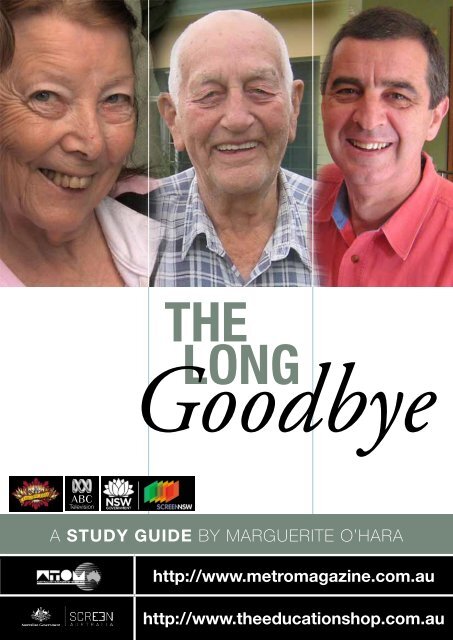
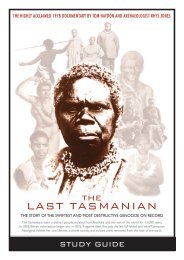
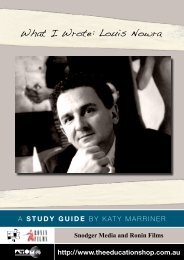
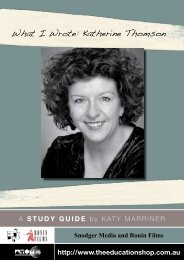
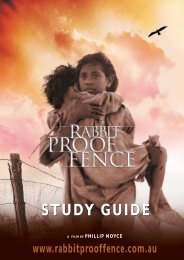
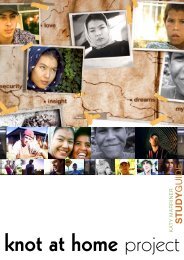
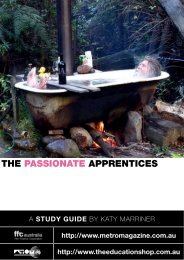
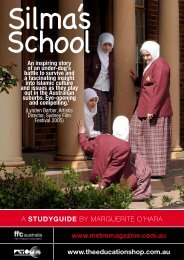
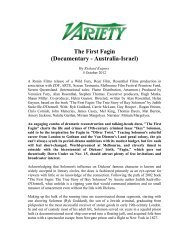
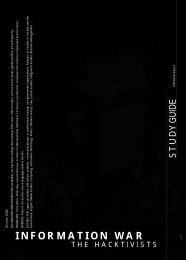
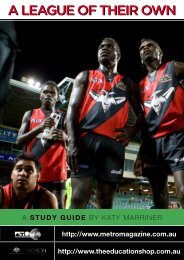
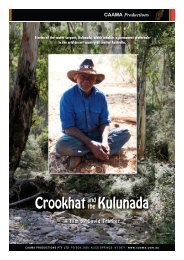
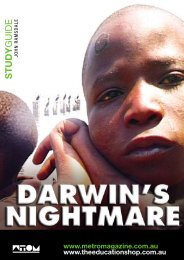
![to download FROHE OSTERN! [HAPPY EASTER!] - Ronin Films](https://img.yumpu.com/33740736/1/184x260/to-download-frohe-ostern-happy-easter-ronin-films.jpg?quality=85)
